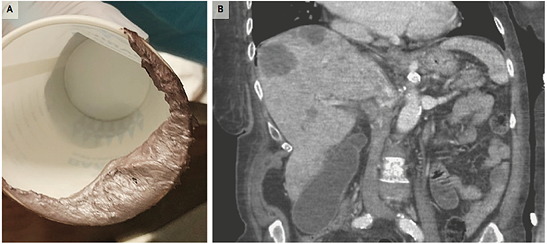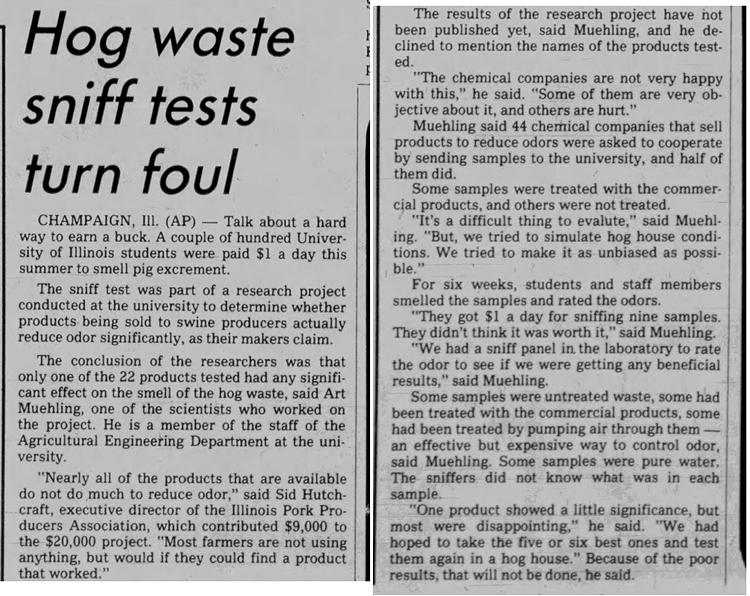Excrement
Urine Bread 2.0
Eight years ago, I posted about how prisoners held in a Japanese interment camp during World War II learned how to make bread using urine instead of yeast.Now I see that urine bread, of a kind, is back in the news. From bakeryandsnacks.com:
Raguet hopes to "break taboos over excrement" and create a more sustainable food and farming system that makes use of human refuse, while cutting farming costs and boosting crop yields.
More info, in French, here (pdf).

The toilets in which the urine was collected
Posted By: Alex - Wed Jul 22, 2020 -
Comments (0)
Category: Food, Body Fluids, Excrement
Silver Stool
The New England Journal of Medicine recently reported on a case of a woman whose poop turned silver. Or, at least, silver-colored.She wasn't drinking silver, which would have been an easy solution to the mystery. Instead, the doctors offered this explanation:
In light of this case, the website PoopColors.com should be updated to include silver.

Posted By: Alex - Mon Jul 20, 2020 -
Comments (4)
Category: Excrement
Ex-Lax Movies
An 'Ex-Lax Movie' doesn't sound like something I'd want to watch. Actually, it's something I'd actively avoid. And I can't imagine the phrase sounded much better back in 1939 and '40 when Ex-Lax ran these ads in magazines such as Life and Woman's Home Companion.
Betty: I don't know which is worse... constipation or the remedy!
Sally: You're silly to punish yourself that way. Why don't you try Ex-Lax?
Betty: Ex-Lax? You expect that to work for me... a little chocolate tablet?
Sally: Don't let its pleasant taste deceive you. Ex-Lax is a dependable laxative—thorough and effective!
LATER
Betty: No more strong, bad-tasting laxatives for me! That Ex-Lax was just the thing. It fixed me up fine!
Sally: What did I tell you! We've used Ex-Lax in our family for over 30 years.

Mr. A: Whew! I hate the very thought of having to take a cathartic.
Mr. B: You wouldn't if you'd try Ex-Lax. It tastes swell—just like chocolate.
Mr. A: Ex-Lax? That's what we give the youngsters. What I need is dynamite!
Mr. B: Don't kid yourself! Ex-Lax is plenty effective, if that's what's worrying you!
LATER
Mr. A: Boy, I feel like a million this morning! That Ex-Lax sure is great stuff!
Mr. B: You said it, pal! We've been using Ex-Lax in our family for more than thirty years!

Mr. Wright: Gee, Honey, this stuff is awful! Why do all laxatives taste so bad?
Mrs. Wright: All of them don't. Ex-Lax tastes like delicious chocolate.
Mr. Wright: Ex-Lax! That's all right for you and Junior, but I need something stronger!
Mrs. Wright: No you don't! Ex-Lax is as effective as any bad-tasting cathartic.
LATER
Mr. Wright: I sure am glad I took your advice. It's Ex-Lax for me from now on.
Mrs. Wright: Yes, with Ex-Lax in the medicine chest we don't need any other laxative!
Posted By: Alex - Fri Dec 06, 2019 -
Comments (3)
Category: Advertising, Excrement, 1940s
Indlovu Gin
The website for Indlovu Gin describes it, somewhat euphemistically, as "The only gin designed by the African elephant from foraged botanicals." Put in plainer language, it's gin made with elephant dung. As the AP reports:
Posted By: Alex - Mon Nov 25, 2019 -
Comments (3)
Category: Animals, Excrement, Alcohol
Pig Poop Sniffer
If you think your job sucks, it could always be worse. You could be smelling pig excrement for $1 a day.
Cedar Rapids Gazette - Aug 25, 1978
Posted By: Alex - Sun Oct 13, 2019 -
Comments (1)
Category: Animals, Jobs and Occupations, Excrement, 1970s
Follies of the Madmen #443

A toilet seat is never, ever going to resonate with "jewels."
Source.
Posted By: Paul - Tue Sep 10, 2019 -
Comments (4)
Category: Business, Advertising, Domestic, Interior Decorating, Body Fluids, Excrement, Flatulence, 1960s
Relaxed Joggers
Awkward placement of the tie dye on these sweatpants, available from ASOS.
Posted By: Alex - Sat Aug 17, 2019 -
Comments (2)
Category: Fashion, Excrement
Project Capricious
During World War II, the OSS (precursor to the CIA) hatched a plan to defeat General Rommel's Afrika Korps by using synthetic goat poop. The idea was to drop huge amounts of pathogen-laced pseudo-poop over African towns. Local insects would be attracted to the stuff and would then carry the pathogens to Rommel's troops. However, before the plan could be carried out, Rommel's troops were withdrawn from the area and sent to Russia.Jeffrey Lockwood tells the story in more detail in his book Six-Legged Soldiers: Using Insects as Weapons of War.
The plan was to weaken the enemy forces by using flies to spread a witch's brew of pathogens. Given the agency's inability to rear an army of flies, [OSS Research Director] Lovell decided to conscript the local vectors...
Lovell was a chemist, but he'd been out of the laboratory often enough to know that flies love dung. And with a bit of research, he discovered a key demographic fact: There were more goats than people in Morocco — and goat are prolific producers of poop. Lovell now had the secret formula: microbes + feces + flies = sick Germans. Now all he needed was a few tons of goat droppings as a carrier for laboratory-cultured pathogens.
The OSS collaborated closely with the Canadian entomological warfare experts to launch one of the more preposterous innovations in the history of clandestine weaponry: synthetic goat dung. Of course flies are no fools; they won't be taken in by any old brown lump. So the OSS team added a chemical attractant. The nature of this lure is not clear, but a bit of sleuthing provides some clues.
Allied scientists might have crafted a chemical dinner bell by collecting and concentrating the stinky chemicals that we associate with human feces (indole and the appropriately named skatole). While these extracts would have worked, the more likely attractant was a blend of organic acids, some of which had been known for 150 years. Two of the smelliest of these are caproic and caprylic acids, which, by no coincidence, derive their names from caprinus, meaning "goat." Etymologically as well as entomologically astute, Lovell named the operation Project Capricious. So with a scent to entice the flies, Lovell's team then coated the rubbery pellets in bacteria to complete the lures.
All the Americans had to do was drop loads of pathogenic pseudo-poop over towns and villages where the Germans were garrisoned, and millions of local flies would be drawn to the bait, pick up a dose of microbes, and then dutifully deliver the bacteria to the enemy. Lovell worried about keeping the operation clandestine. The Moroccans had to be persuaded that finding goat droppings on their roofs the morning after Allied aircraft flew over was a sheer coincidence. Presumably a good disinformation campaign can dispel almost any suspicion, or, as Lovell intimated, if the plan succeeded there would be very few people in any condition to raise annoying questions about fecal pellets on rooftops...
In the end, however, Lovell didn't have to worry about getting caught by either friends or foes, as the secret weapon was never deployed. Just as the OSS was gearing up to launch the sneak attack, the German troops were withdrawn from Spanish Morocco. They might well have preferred to take their chances with pathogen-laden flies, given that Hitler was sending them to the bloody siege of Stalingrad.

Posted By: Alex - Sat Jul 20, 2019 -
Comments (5)
Category: Insects and Spiders, Military, War, Weapons, Excrement, 1940s
Poop Slinger - The Game
It doesn’t exactly look like the most sophisticated game. So why are copies of Poop Slinger selling for close to $3000 on eBay? Because it’s the rarest PlayStation 4 game in existence. Only 84 copies were ever sold, making it a collector’s item.Read the full story at: vg247.com


Posted By: Alex - Tue Jul 16, 2019 -
Comments (2)
Category: Overpriced Merchandise, Excrement, Collectors, Videogames and Gamers
Shoo: The Deterrer of Pooping Dogs
Thirteen-year-old Noah De La Paz of California has invented a device to stop dogs from pooping on the lawn of his family’s house. It uses a camera and image-detection software. When a dog is identified, his device emits a high-pitched sound to encourage the dog to move on. Although still in the prototype stage, Noah hopes to eventually bring his invention to market.I can see some potential problems with his invention. Such as that it doesn't seem to differentiate between pooping and non-pooping dogs. But even so, it sure would beat the currently most popular method of preventing unwanted poopers, which is to put up angry, threatening signs on your lawn.
More info: Spectrum News
Posted By: Alex - Thu Jul 11, 2019 -
Comments (4)
Category: Inventions, Excrement, Dogs

| Who We Are |
|---|
| Alex Boese Alex is the creator and curator of the Museum of Hoaxes. He's also the author of various weird, non-fiction, science-themed books such as Elephants on Acid and Psychedelic Apes. Paul Di Filippo Paul has been paid to put weird ideas into fictional form for over thirty years, in his career as a noted science fiction writer. He has recently begun blogging on many curious topics with three fellow writers at The Inferior 4+1. Contact Us |




